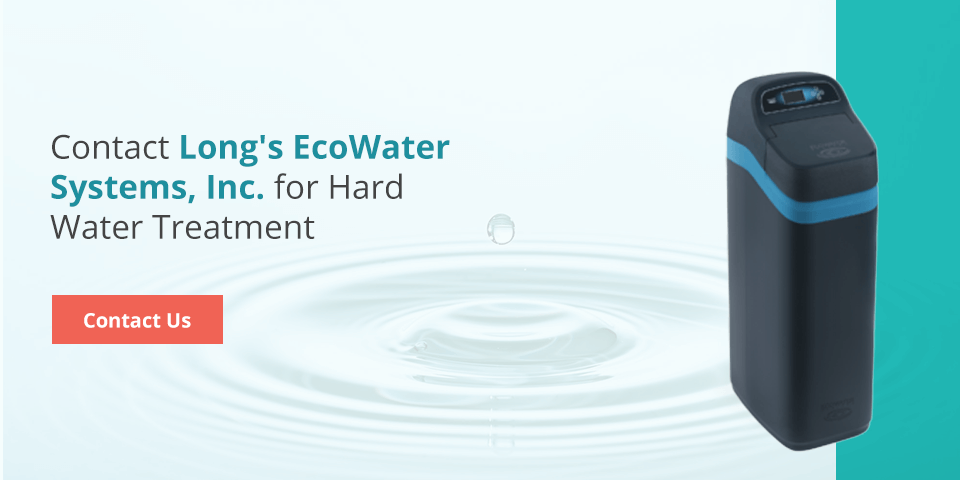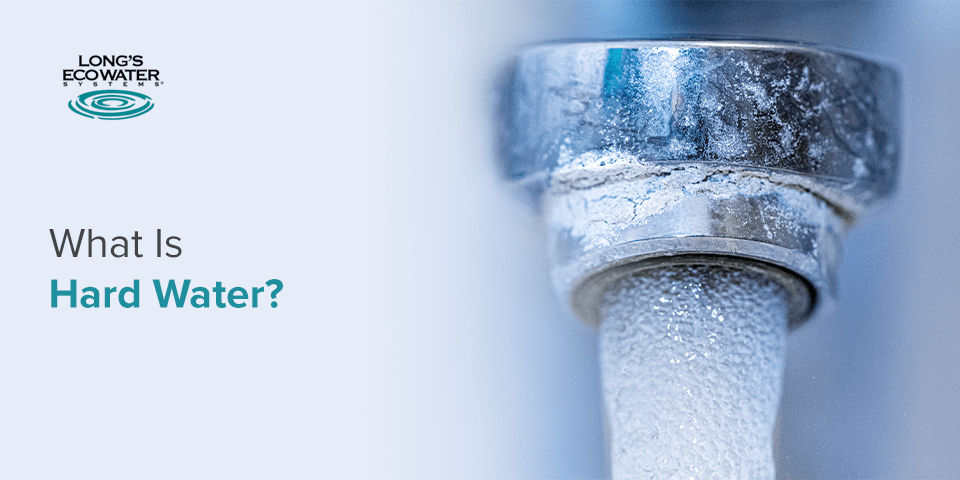
When you turn on one of your home’s water faucets, you may only be thinking about your current task, quickly moving on to the next thing. You use your home’s water supply to clean dishes, quench your thirst, cook dinner and bathe, sometimes without giving the actual water a second thought. But different types of water exist, and they can have an effect on you and your home.
It’s important to be mindful of the type of water that’s entering your house. As you’ve started to become aware of what’s in your water and the effects your water could have, you may have come across some new terms like hard and soft water. You may have even heard to beware of hard water.
But what are hard water and soft water? Is one better than the other? Keep reading to learn about the differences between these two types of water so you can make the right choices for yourself and your family.
Hard vs. Soft Water
It’s important to understand what type of water you have coursing through your house. If you have hard water, should you take measures to soften it? What should you expect if the water in your area is already soft? You need to be able to tell the difference so you can make educated decisions regarding your home’s water situation.
If you have public water, you can contact your water provider and ask for information about your area’s water. This is a good first step, but it’s still essential that you know about the two types of water so you can understand their characteristics and effects.
What Is Hard Water?
It could be impossible to tell hard water apart from soft water at first glance or first touch. Hard water usually appears crystal clear like any type of regular water you’ve seen, and it can feel the same to the touch, as well. You have to zoom in to a more microscopic level to know what sets hard water apart from soft water.
Hard water gets its characteristics from what’s in it. Put simply, hard water is water that has a high mineral content. The minerals in hard water include varying levels of magnesium and calcium sulfates, carbonates and bicarbonates. Trace amounts of other minerals will also exist. Essentially, the more magnesium and calcium that dissolves into the water, the harder the water will be.
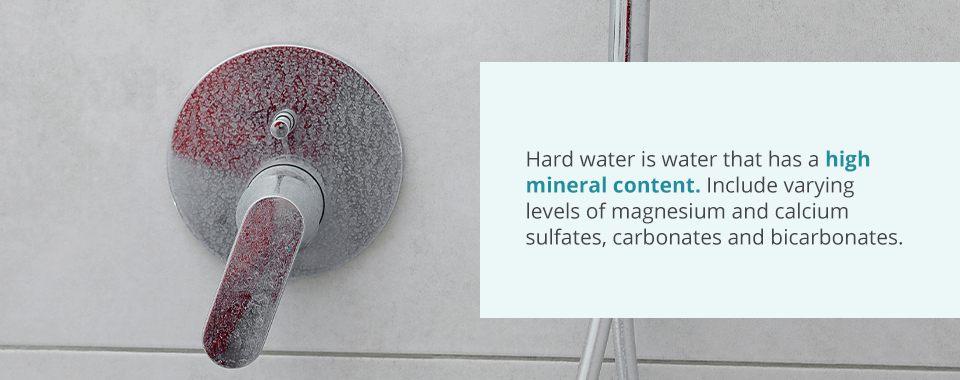
The water cycle naturally leads to the creation of hard water. Hard water can even occur in city water systems and homes with well water, despite some popular beliefs that say otherwise. Water hardness levels are different everywhere, even leading to neighboring counties and towns having differing levels of water hardness. So, even if you live in a city, you could still have hard water flowing through the pipes in your house.
It all depends on where you are and the mineral content of the water supply in your area. Your municipality’s protocols when it comes to softening the water for your area will also have an impact on the hardness of your water.
Effects of Hard Water
Hard water has effects — some more noticeable than others — that you should know about. Being able to identify the signs and effects of hard water will help you know if you need to do something about your home’s water situation.
Here are some common effects of hard water:
- Stains: Hard water can cause stains to appear in tubs and sinks. This is due to water drying in these basins, leaving behind rings and blotches from deposited minerals.
- Higher water bills: Your appliances may end up working harder as a result of mineral deposits from the hard water, which could lead to higher water bills. When your appliances have to work harder to maintain the desired output, their chances of needing more frequent maintenance and repairs increase. This could lead to some unexpected expenses.
- Ruined clothing and linens: The minerals in hard water may ruin your linens and clothes as you wash them over time. Eventually, the colors could become dull and the textures can take on a rougher feeling. You may need to buy replacements sooner than if you had soft water.
- Scaling: Scaling is a phenomenon where water leaves behind excess calcium minerals on the surfaces it comes in contact with. It takes on the form of a white, chalky residue. If your home has hard water, you may encounter scaling on your faucets, handles and even on your dishes after washing them.
- Fewer suds and foam when lathering soap: You’ll really feel the effects of hard water when you’re bathing, washing your hands or washing the dishes. You’ll notice fewer suds and less lathering ability from soap products and shampoos when you mix them with water and scrub.
- Soap scum: When you wash your hands with hard water, you may feel a slight film on your hands afterward. This is from the soap scum left behind. Soap scum is a reaction between the calcium minerals in hard water and soap. You may have to rinse your hands a bit longer when using hard water to get rid of this film.
- Flat hair and dry skin: You may experience dry skin and flat hair as a result of bathing with hard water. Since hard water does a poor job of lathering soap and rinsing it away, it’s going to stay on you. This can cause your skin to dry out and your hair to feel heavier, drier and flatter.
- Low water pressure: Buildings with hard water may provide low water pressure because of clogged pipes. As hard water travels through pipes, it’ll leave behind mineral buildup. Over time, this buildup can get so bad that it clogs the pipes, leading to lackluster water pressure from faucets and shower heads.
What Is Soft Water?
If hard water contains varying concentrations of minerals, soft water has a smaller concentration of these minerals, comparatively. The hardness of water exists on a scale, which means some hard water can be “softer” than other types. The softest water will have the smallest content of absorbed minerals like calcium and magnesium. Due to the process of softening water, soft water often has higher concentrations of sodium than hard water.
Soft water has unique characteristics that many people find desirable both personally and economically, as you’ll see below. For those reasons, many cities and urban areas take measures to soften the water in their area.
Effects of Soft Water
Here are some of the things you could experience if you have soft water in your home:
- Fewer stains and less scaling: Fewer minerals in your water means you’ll deal with fewer instances of staining and scaling on surfaces that hold or contact water in your home. Having fewer stains means you’ll clean less and enjoy a more attractive home environment.
- Lower water bills: Your water fixtures and appliances will have an easier time moving the water throughout your house, which can lead to reduced water bills compared to hard water. This could mean fewer repairs and maintenance calls, letting you keep even more money in your pocket at the end of the month.
- Preserved clothing: Soft water is much easier on your clothes and linens. The colors will last longer, and washing with soft water should also keep the textures feeling softer for more wear time.
- Healthy lathers and soap rinsing: You can create a nice lather with soap and soft water. Your skin and hair may feel better after bathing since soft water will more easily rinse the soap and hair care products off your body. After washing, you should experience little to no feelings of a film or residue left behind. This also means soap scum will be less of an issue on your dishes or shower surfaces.
- Good water pressure: Soft water has a low mineral concentration, which means you’ll avoid mineral deposits in your pipes. You’ll get much better water pressure as a result, which is always ideal.
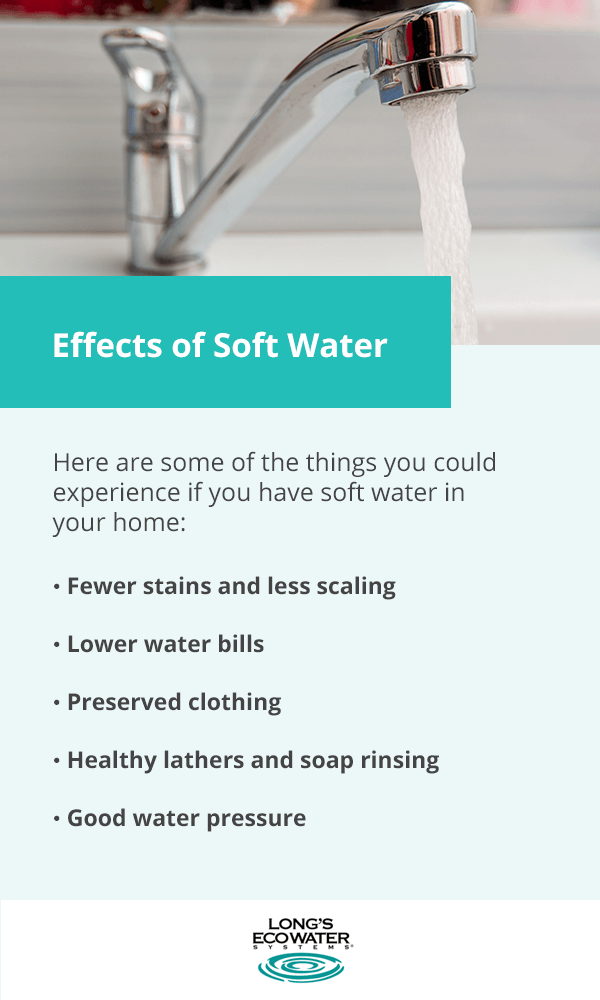
As you can see, soft water has many benefits over hard water. This is one of the reasons having soft water in homes is so popular, and why cities will soften their area’s water. Still, you should consider both the pros and cons of soft water:
- Increased sodium levels: Sodium is the most common element used in the processes of softening water. It’s safe to drink, but people with high blood pressure or people who are trying to reduce their sodium intake should be aware of the increased sodium presence in soft water.
- Lead leeching: Soft water may want to pull minerals from your pipes, which is a problem if your pipes contain lead. Without proper treatment to avoid lead leaching, soft water could pull that lead and make your water unsafe to use.
- Fewer essential minerals: Calcium and magnesium are both essential parts of a healthy diet. Those who consume diets low in calcium and magnesium may need to take supplements like multivitamins to make up for the minerals they’re missing in their soft water.
Is Hard Water Bad for You?
After reading the above sections, you may be wondering if hard water is bad for you. True, hard water puts you at risk of experiencing a few undesirable side effects like damage to your appliances, stains, scaling and discomfort from a lack of lathering. But what really matters is whether hard water puts you or your family at risk of negative health outcomes.
The good news is that research has shown little to no health risks associated with drinking hard water. In fact, the magnesium in hard water may actually possess some protective qualities that could reduce one’s risk of experiencing cardiovascular issues, although some research is still necessary. As you read above, some of the minerals present in hard water can help round out one’s intake of essential minerals.
Your best bet is to ask your municipality for a water test that lists the minerals in your home’s water supply and their percentages. Use this information to determine what minerals you’re consuming and what their effects are. Show your doctor or health specialist this information and ask for their input on whether you need to add any supplements to your diet or consider softening your water.
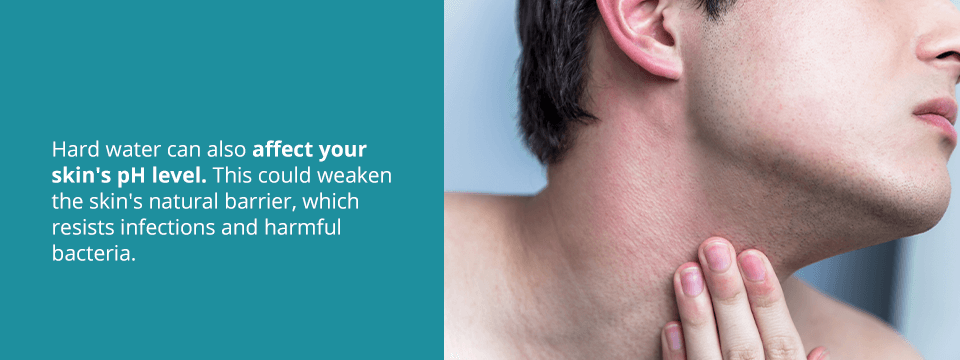
Possible Health Risks of Hard Water
Another health factor to consider is the dry skin and hair that bathing with hard water can cause. You may feel itchy or uncomfortable after bathing. You may have to use moisturizers or specialty products to prevent your skin and hair from drying out. These effects can be especially burdensome on people who already deal with dry skin, so you should be aware of the type of water you have if this is something you can relate to.
Hard water can also affect your skin’s pH level. This could weaken the skin’s natural barrier, which resists infections and harmful bacteria. For people with skin conditions including eczema, this can be a serious factor against using hard water. Be sure to talk to your doctor about measures you could take to limit negative health outcomes from hard water like this.
Hard Water Treatment
You may choose to treat the hard water in your home to make it softer. You can do this with a water softening system. These systems run hard water through a sticky, insoluble resin that has a coating of positively charged sodium ions. Positive sodium ions have an electric charge, which causes them to replace calcium and magnesium in the hard water. The result is soft water coursing through your home’s water appliances.
Water softening systems need consistent maintenance to stay functional. The resin can attract fungi and bacteria, so you may consider hiring a professional to conduct regular inspections and cleanings. You’ll also need to add sodium pellets to the system to give the resin the positive electric charge it needs to remove the unwanted minerals from the water. Some systems use potassium pellets, which may be ideal if you or anyone in your family needs to watch their sodium intake.
Contact Long’s EcoWater Systems, Inc. for Hard Water Treatment
Long’s EcoWater Systems has the water treatment services and products you need to have peace of mind about your home’s water situation. If you’re dealing with the negative effects of hard water in your home, then our hard water treatment services are the answer you’ve been looking for. EcoWater Softeners use much less salt and water compared to other brands. Additionally, they are self-cleaning and carry bonded warranties. We’ll test your water and ensure you get the best water softener for your family’s needs.
Whether you need a repair or a new installation, we’re the ones to call. Live in Allentown, Macungie, Bethlehem or anywhere throughout the Lehigh Valley? Contact us today to schedule a free water test or get more information about our services. You can also browse our resources to do your own research on topics relating to your home’s water.

